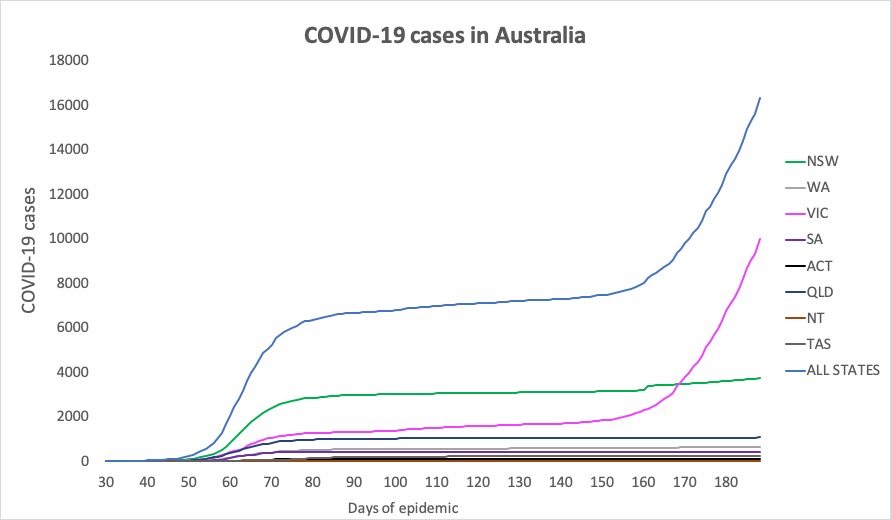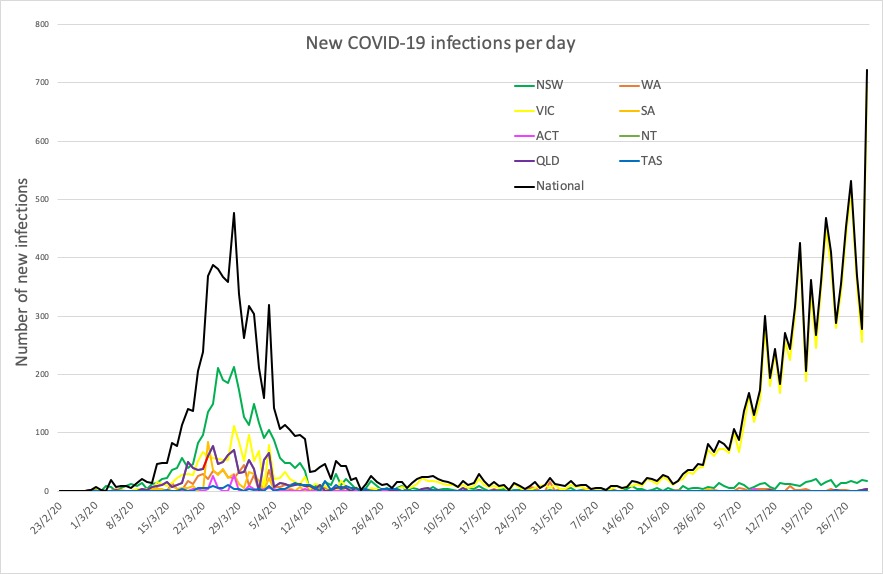Around one-quarter of the 500 COVID-19-positive Victorians who were visited by health authorities yesterday were found not to be at home.
Welcome to The Medical Republic‘s COVID Catch-Up.
It’s the day’s COVID-19 news into one convenient post. Got any tips, comments or feedback? Email me at bianca@biancanogrady.com.
30 July
- One in four Victorians who tested positive to COVID-19 recently were found not to be at home.
- Face masks mandatory in Victoria, and recommended in New South Wales.
- WHO publishes advice on celebrating Eid al-Adha safely during the pandemic.
- RACGP releases guidelines on establishing and running GP-led COVID-19 respiratory clinics.
- Dexamethasone advised for all adults with COVID-19 and on oxygen or ventilation.
- Be aware of risk of Strongyloides hyperinfection if treating at-risk patients with dexamethasone, experts warn.
- Clusters grow in NSW, and Queensland reports three new infections in travellers.
- Around one-quarter of the 500 COVID-19-positive Victorians who were visited by health authorities yesterday were found not to be at home, according to Premier Dan Andrews.
Speaking at a press conference today, where he announced today’s tally of 627 new infections and another eight deaths, the premier expressed his frustration at the number of people who knew they had tested positive to the virus but were not quarantining at home.
“It is simply not acceptable for you to have this virus and not be at home,” he said. More than 100 of those cases have now been referred to Victorian police.
Meanwhile, as Victoria’s total number of cases tips over 10,000, the premier said all Victorians who tested positive to the virus would now be followed up with a home visit, not only to ensure compliance with quarantine orders but to offer support where needed. He mentioned cases where those isolating were helped with getting scripts filled and with purchasing groceries.
As Victoria approaches the half-way point of the six-week lockdown period, the premier also flagged the possibility of further restrictions being implemented in an effort to control community transmission in the state.
“We could not open up with these numbers – we could not open up with even significantly less than these numbers,” he said. “There can be no economic recovery until we deal with this public health challenge.”
A team of public health experts has been tasked with dissecting the figures from Victoria’s outbreaks to see whether there are any trends or features that could guide further interventions to control the spread of the disease. An update on this is expected in a few days. - The latest update on face masks in Australia is that all Victorians must now wear them, and the federal health department is also now advising that people in NSW should consider wearing a face mask in situations where physical distancing is not possible.
- As Muslims around the world celebrate Eid al-Adha – one of two major celebrations in the Islamic calendar – the World Health Organisation has issued advice on how to celebrate the festival safely during the COVID-19 pandemic.
It includes advice on physical distancing during celebrations – for example, encouraging events to be held outside, regulating the movement of people to help minimise contact, and shortening the duration of events where possible – and how to conduct charitable acts, such as donations of food, so as to minimise the risk of transmission. - The RACGP has published guidelines on establishing and managing GP-led COVID-19 respiratory clinics. The document covers issues such as governance of such clinics, infection control, triage, testing, and follow-up. It also includes templates for patient notification, pathology requests, and completed encounter forms.
- Dexamethasone is now recommended for all adults with COVID-19 who are receiving oxygen, including those on mechanical ventilation, according to the latest update from Australia’s National COVID-19 Clinical Evidence Taskforce.
The recommendation is for 6 mg daily, either intravenous or oral, for up to 10 days. However, it is not recommended in patients who are not receiving oxygen.
The Taskforce has also suggested that prone positioning for more than 12 hours a day be considered in mechanically ventilated patients with COVID-19 and hypoxaemia. The latest update advised against using darunavir-cobicistat to treat COVID-19, unless within the context of a clinical trial, and included advice on using ECMO in mechanically ventilated pregnant women with COVID-19. - A paper in JAMA has raised the issue of Strongyloides hyperinfection in COVID-19 patients treated with the steroid dexamethasone.
Strongyloidiasis is caused by nematode Strongyloides stercoralis, and is endemic in tropical and subtropical regions around the world, including Australia. Chronic infection is largely asymptomatic, but when an infected individual is treated with any kind of immunosuppressive agent, including corticosteroids, it can lead to severe hyperinfection which is frequently fatal.
The authors of the paper suggested that patients with COVID-19 who are at moderate or high risk of Strongyloides infection – and who have not previously been tested or treated – should be considered for presumptive treatment with ivermectin before treating them with dexamethasone. - New South Wales reported another 21 new cases of COVID-19 yesterday. Most are associated with known clusters including Our Lady of Lebanon church in Parramatta, The Apollo restaurant in Potts Point and Thai Rock restaurant in Wetherill Park. The Potts Point Cluster now numbers 19 people, and 23 cases are associated with a cluster of funerals in western Sydney.
Queensland has three new cases, two of which had recently returned from hotspots in NSW, and one of which was a returned traveller from overseas. All three were in quarantine at the time of diagnosis.
Here are the confirmed COVID-19 infection numbers around Australia to 9pm Thursday:
National – 16,303, with 189 deaths and 330 hospitalised.
ACT – 113
NSW – 3736
NT – 31
QLD – 1082
SA – 449
TAS – 228
VIC – 9998
WA – 665




